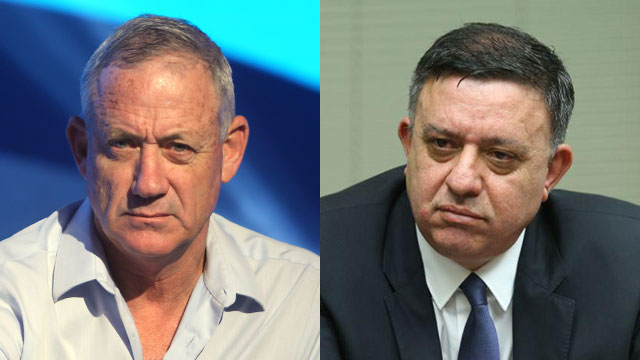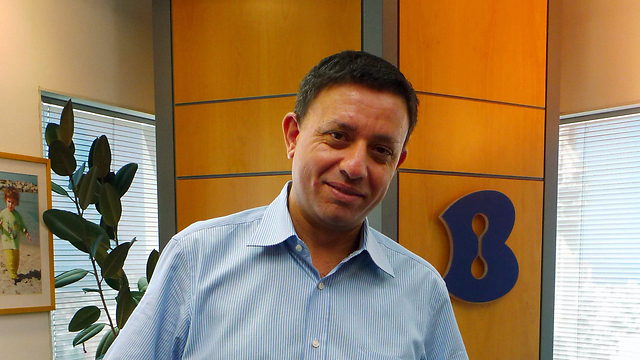
Why do Israelis have a soft spot for generals as politicians?
Opinion: If a candidate's suitability to run the country was tested by sensible parameters, Gantz and Gabbay would be facing the same electoral prospects. But this is not the case: the masses want their leader to have the blue-eyed career soldier and not the brown-eyed man who rose to the top of the business world from humble beginnings in a transit camp.
Both were talented children who were accepted at prestigious schools. Both worked during their vacations — one in the fields and the other in hotels.
After graduating from high school, both were drafted into the Israel Defense Forces, and continued as career soldiers after their compulsory service. One remained in the army, moving up through the ranks, while the other retired after reaching the rank of a major. The latter studied economics studies at the Hebrew University of Jerusalem and began working in the Finance Ministry's Budget Division, at the time seen as the civil service's most prestigious department. After deciding to leave the civil service, he climbed to the top in the private sector and was appointed CEO of Bezeq—one of the most biggest and most important corporations in Israel.
But our other protagonist was gaining his own life experience, in the military. He also made it to the top of his chosen profession, becoming the 20th IDF chief of staff. He led major military operations, and after extending his tenure by one year decided to leave army life and tried his luck in the business world. Unfortunately, he failed.
When our businessman felt he had exhausted his abilities as the Bezeq CEO, he entered politics, joined a party and was appointed minister. Not an important one, but still a minister.
Following the announcement of a snap April election, our soldier also decided to go into politics. And there his path crossed the businessman, who by now had chosen a new party to call home, become its chairman, and cemented himself firmly in the political world.
Two men, two parallel paths. Both have the same ideology. It would not come as a surprise if both of them were to deliver the same speech, using the exact same words. Both have an almost identical perception of Israel's security, and their social-economic approach is also similar. I doubt if anyone can guess which of the two said: "My parents—who cherished the values of justice and fairness—taught me to work hard and show personal responsibility."
Both of them are united by their profound aversion to Prime Minister Benjamin Netanyahu. While one compared Netanyahu to royalty, the other said he acts like a mafia boss.
Both of them are native-born Israelis, or sabras, children of immigrant parents, men who molded their lives with their own hands. Both of them are successful. But if the elections were to be held now, one's party would earn more than 20 Knesset seats according to the polls, while the other's party would gain a mere 6-7 seats.
And why is that? Why does the Israeli voter prefer the one who built his career in an olive green uniform over the one who made something of himself while wearing a suit and tie? Why do we prefer as prime minister the one who up until a month ago was careful not to dangle his feet in the dirty waters of politics, and not the one who plunged his entire body into that murky pool in order to purify it?
Itt seems we are ready to vote in droves for a man who mainly knows how to command people, rather than for someone who knows how to manage people.
The masses want their leader to be the enchanting blue-eyed soldier who won them over with stories of a childhood spent running in the fields rather than the brown-eyed businessman whose stories about his childhood in a transit camp failed to move them. But why?
My questions of course refer to former chief of staff Benny Gantz and former Bezeq CEO and current Chairman of the Labor party Avi Gabbay. One of the answers could be the credibility gap.
The taciturn Gantz, who until recently was unaffiliated with any party, has long been perceived as a credible man, and even more so after his debut speech. He inspires trust in people, as opposed to Gabbay who dented his own credibility when he broke ties with the Kulanu Party and its leader, Finance Minister Moshe Kahlon, and later joined the Labor Party. He also slammed Netanyahu while serving as his environmental protection minister and to top it all, he publically dismantled the Zionist Union, abruptly ending his partnership with Tzipi Livni in front of the cameras and without her knowing in advance.
In his election campaign, Gabbay portrays himself as the leader of the party that battles against the rising cost of living, and as one who seeks to make social changes in the Israeli society.
Gantz, on the other hand, is waging his campaign as a national leader. But various factors have the power to influence the voters—despite Netanyahu's low credibility, he won the 2015 elections, and there is no need to say very much about US President Donald Trump's credibility.
In an election season in which a politician's suitability to lead the nation were tested according to rational parameters, Gantz and Gabbay's electoral prospects would have been more or less the same. But this is not the case. Our society is impulsive, prone to superlatives, unbridled emotion and on a perennial hunt for a redeemer. Gantz is beating Gabbay in this race, at least until we see whether the former chief of staff really does have what it takes to save us from ourselves.




















